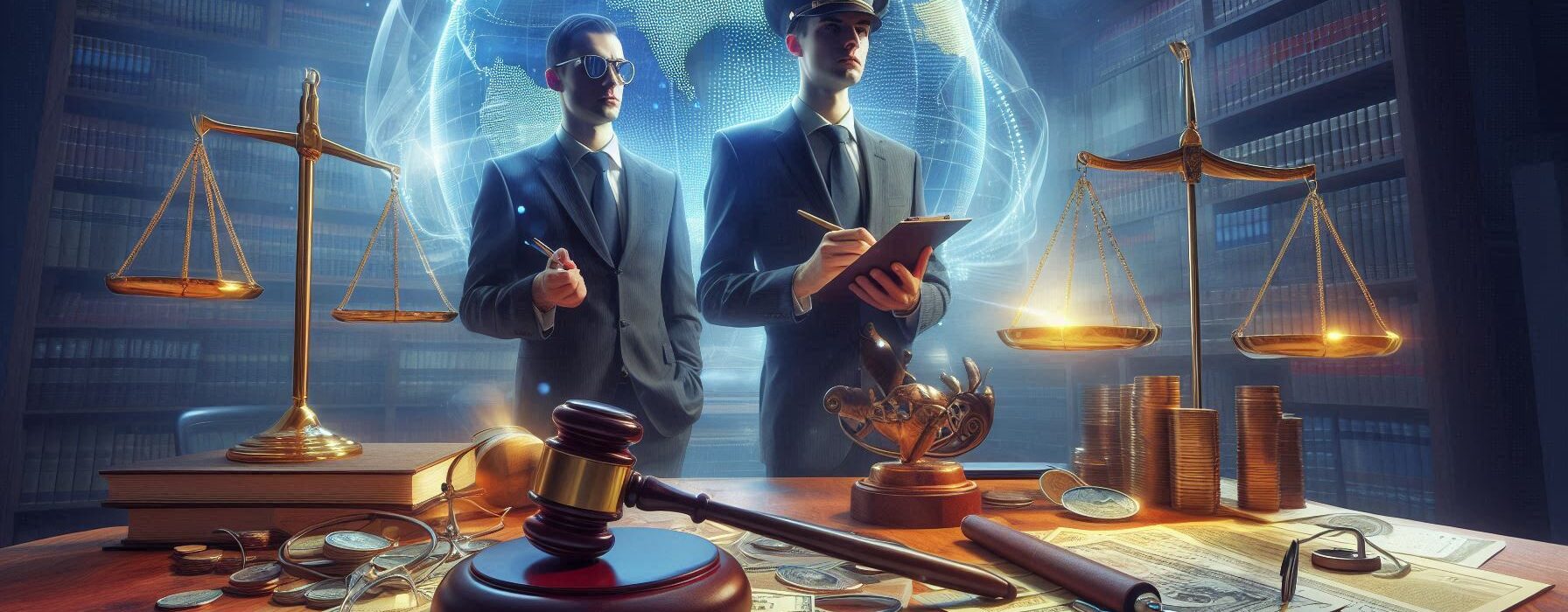Getting ready to file a lawsuit can feel like getting ready for a grand adventure with lots of twists and turns and maybe even some dragons (or at least some paperwork). If someone has harmed you and you’re ready to do something about it, it’s important to know how the process works. So, grab your favorite snack, get comfortable, and let’s go through this step-by-step approach that will help you get through the often muddy seas of legal conflicts.
Top Takeaways and Key Concepts
Confirm your case is valid before filing. Consult a qualified lawyer to ensure your claim has legal merit.
Gather and organize solid evidence. Collect contracts, messages, photos, and witness statements early to strengthen your case.
Hire a specialized, communicative lawyer. Choose someone experienced in your case type who clearly explains each step.
File and serve documents correctly. Follow court rules precisely and use professionals for serving papers to avoid delays.
Stay organized through discovery and trial. Track all documents, deadlines, and communications to stay prepared and confident.
Summary of This Article
This article offers a humorous yet practical walkthrough of the lawsuit process—from deciding if you have a case to celebrating your victory. It begins by stressing the importance of determining whether your claim has legal standing and gathering strong evidence like contracts, emails, and witness statements. Readers are guided through hiring the right attorney, filing the complaint properly, and ensuring the defendant is served according to legal standards. The piece highlights how organization and attention to detail are crucial during the discovery phase and trial, where evidence and presentation can determine the outcome. Blending humor with insight, it encourages readers to approach the legal journey with preparation, patience, and persistence—turning a daunting process into an empowering quest for justice.
Understanding Your Case

Please Note: This post may contain affiliate links. If you click one of them, we may receive a commission at no extra cost to you. As an Amazon Associate, I earn from qualifying purchases.
👓 Did you know that in 2007, a man filed a lawsuit against the company that made his toaster? He claimed it had “failed to toast” his bread properly and caused him emotional distress. The case was dismissed, but not before sparking debates about whether kitchen appliances should come with emotional support! 👓
“Justice delayed is justice denied.” — William E. Gladstone
Before getting into the legal system, you need to know if you even have a case worth pursuing. Think about this: Did someone break their agreement? Was an accident caused by someone else’s carelessness? Or maybe you’ve been hurt in some other way? This contemplation isn’t only about feeling right; it’s also about getting ready for what’s next.
People sometimes file lawsuits without thinking about whether they have a good case because they assume they’ll win large. It sounds enjoyable to try to build a sandcastle without any sand, but it’s not. You might wish to talk to a lawyer who knows a lot about cases like yours. They can assist you figure out if your case is worth pursuing and what you should do next.
Witty Wonders of Lawsuits: Fun Facts You Didn’t Know
– The World’s Most Expensive Coffee: In 2014, a man in the UK tried to sue his local café for $5 million after he spilled coffee on himself. Turns out, the real lawsuit was against his decision to order a “super hot” drink while wearing white pants!
– The Great Toilet Paper Case: A couple once sued their neighbor because they claimed their tree blocked sunlight from hitting their prized toilet paper collection. Yes, you read that right—some people really do take their TP very seriously!
– A Dog’s Day in Court: A famous case involved a dog named “Buster” who was declared the rightful owner of a house after his human died. The court ruled Buster could stay as long as he paid rent in treats! Talk about a paw-some legal victory!
Once you’ve looked over your scenario and decided that you do have a case for a lawsuit, it’s time to get proof. This is when the real detective work starts! You should think of this process as gathering treasure for your adventure. Every piece is important! Like pirates looking for gold doubloons, you’ll have to dig deep and be thorough.
If you have contracts, receipts, or any other paperwork that has to do with your case, those are like gold. They show that what was promised or agreed upon was done. For instance, if you’re suing someone for not delivering a service as promised, having a copy of the contract can make a big difference. It’s like holding an ace in your hand during a poker game; your opponent won’t know what hit them!
Emails and texts are next on the list. In our digital age, these might be very important pieces of proof. Did someone say something in an email that goes against what they are saying now? You got it! Screenshots or saved threads might be very helpful in proving your claims. Think about how much better it would be to show a court that they not only agreed to specific things verbally but also put them in writing.
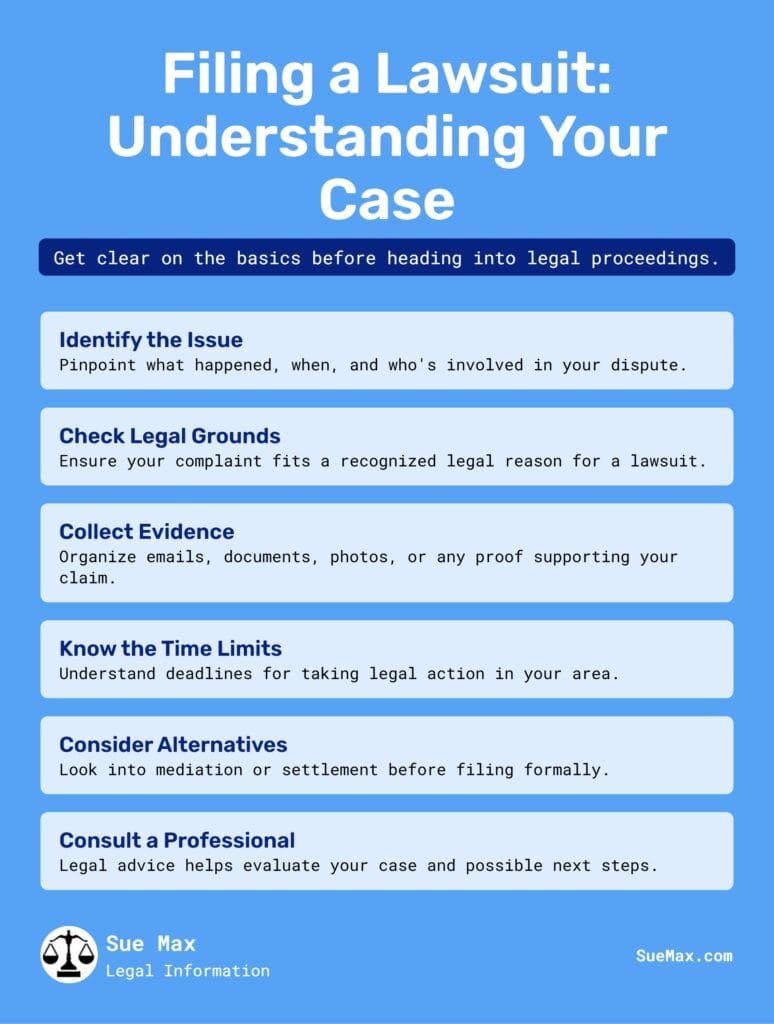
Pictures can also be a very important part of gathering evidence. If you’re in a personal injury case because of an accident, images of the incident can help tell the whole story (pun intended!). People frequently respond more to visual proof than just words. This could be damage to property or obvious injuries.
If there were people nearby who observed what happened and are ready to support your narrative, get their statements written down while the events are still fresh in their minds. Witnesses that can back up your story can make your case much stronger. Think of them as loyal sidekicks who are ready to protect your dignity!
Along with collecting physical things like papers and pictures, you might want to establish a thorough timeline of events that led up to the disagreement. This helps set the scene and demonstrates how things changed over time. Believe me, judges like things to be clear just like everyone else!
There is no document that is too little! Sometimes little things that appear unimportant turn out to be really important pieces of evidence later on. A casual text message could show that the other person meant to do something or agreed with you, which could help your case.
So roll up those sleeves and start collecting! The more organized and comprehensive your evidence is now, the smoother sailing you’ll have later when navigating through legal waters. Happy treasure hunting!
Hiring the Right Lawyer

👓 In 1995, a man in the UK hired a lawyer to sue himself for not taking better care of his health. He claimed he wanted to teach himself a lesson about lifestyle choices. The court dismissed the case, stating it was “a clear waste of resources,” but it sure made for an entertaining legal saga! 👓
“Lawyers are like the stars; even when they fall, they still light up the sky.” — Unknown
Now that you’re convinced you have a valid case, let’s talk about lawyers—the knights in shining armor of the legal world! But before you start waving swords around (metaphorically speaking), finding the right attorney is key. I mean, would you trust just anyone to lead your charge?
When interviewing potential lawyers, don’t hold back! Ask questions like “What’s your success rate?” or “How do we communicate throughout this process?” These queries are vital because having an attorney who communicates well can save everyone from unnecessary headaches later on. Dealing with legal jargon is much easier when there’s someone around who speaks fluent lawyer-ese!
Legal Laughs: Choosing Your Lawyer Wisely
– The Lawyer Who Liked to Sing: One lawyer in California was known for singing his arguments in court. He claimed it helped him remember the details better! Imagine a courtroom where every objection is accompanied by an aria!
– A Million Dollar Mistake: In 2017, a man hired a lawyer who accidentally filed his lawsuit against the wrong “defendant.” Instead of suing the neighbor over a fence dispute, they ended up going after a famous movie star! The star’s response? “I’m not even in that movie!”
– The Lawyer with a Pet Rock: A quirky lawyer once brought his pet rock to meetings, claiming it was his “legal advisor.” He said the rock never disagreed with him—probably because it couldn’t talk!
It’s important to remember that not all lawyers know everything about the law. It’s like trying to get a cat to get a stick—some things just don’t work together! You want to make sure that the person you choose knows a lot about instances like yours. Would you really trust a dentist to do heart surgery? I don’t think so!
When looking for the proper lawyer, the first step is to figure out what kind of legal help you need. Are you coping with an injury? Problems with contracts? How about something more specialized, like family law or intellectual property? It’s important that the lawyer you choose knows a lot about the laws and rules that apply to your case because each area has its own peculiarities and details. You don’t want someone to be fumbling through your documents like they’re attempting to solve a Rubik’s Cube without being able to see it.
It’s time to perform some serious detective work now that you’ve narrowed down your choices. Imagine Sherlock Holmes with a briefcase instead of a magnifying glass. Check out potential prospects online and see what other clients have said about them. Did they win cases like yours? How do they talk to each other? A little research can go a long way, especially because this individual will be speaking for you in court!

Interviews are the exciting part now! This is your chance to ask questions and see if they are really the correct fit for you. Don’t hold back! Find out how they have handled situations like yours in the past and how they plan to handle yours. It’s okay to ask things like “How often will we talk?” or “What’s your success rate?” You deserve to know what’s going on here! To be honest, having a lawyer who can talk to you clearly can save everyone a lot of trouble down the road.
Now let’s talk about chemistry, but not the science sort (though that would help too). You need a lawyer whose personality works nicely with yours. It’s always a positive sign if they appear friendly and willing to share their war memories, maybe even with a little comedy. It’s hard enough to deal with legal problems without having problems with your lawyer!
You’re ready for the next step once you’ve discovered someone who seems like a good fit and hopefully doesn’t mind telling you their combat experiences. It is good to know that you have someone on your side who knows a lot about your problem and can help you. Take a deep breath; you’re one step closer to facing this legal path head-on!
Filing Your Complaint

👓 In 2009, a man filed a lawsuit against the city of Los Angeles because he claimed that his “screaming” cat had caused him emotional distress. His complaint included detailed accounts of how the cat’s nightly vocal performances disrupted his sleep and sanity. The case was tossed out, but it left many wondering if there should be a “meow” clause in noise ordinances! 👓
“I think we’re all just trying to get through life without getting sued.” — Ellen DeGeneres
Here comes the moment of truth: filing your complaint with the court! This document outlines your claims against the defendant (the person or corporation you’re suing) and sets everything in motion. Honestly speaking, filling out forms can feel daunting—like trying to decipher ancient hieroglyphics—but fear not!
You’ll need specific information such as names of both parties involved (yep—even if they owe you money!), details about what happened (don’t forget those juicy facts!), and what kind of relief or compensation you’re seeking. The more thorough you are here, the better prepared you’ll be later on.
Complaints and Giggles: The Art of Filing
– The World’s Shortest Lawsuit: In 2006, a man in New York filed a lawsuit that was just one sentence long! He claimed his neighbor’s dog barked too much. The judge had to read it twice just to make sure he wasn’t missing any details—like the dog’s name!
– The Paper Mountain: When filing a complaint, you might think you need to write a novel. But believe it or not, some lawsuits have been so thick with paper that they were delivered by a truck! It’s like the world’s most boring delivery service.
– Complaining About Complaints: There’s actually a legal term called “frivolous lawsuit.” This is when someone files a complaint that has no real basis—like suing a restaurant because their soup was too hot. Yes, people really do this!
Once completed—and double-checked for typos because nobody wants their name misspelled—it’s time to file! Seriously, nothing says “I mean business” like a court document with your name spelled wrong. Imagine showing up in court, and the judge reads, “Mr. Smith” instead of “Mr. Smyth.” You’d feel like you just tripped over your own shoelaces at a wedding—awkward!
Now, depending on where you live and how technologically advanced your local court system is, this filing process can vary quite a bit. Some courts are living in the future with slick online systems that let you upload documents faster than I can finish a slice of pizza (which is pretty fast!). Others might still be stuck in the Stone Age, requiring you to physically visit them—think of it as a mini field trip but without the fun snacks.
If you’re heading to the courthouse in person, prepare yourself for an adventure! First off, make sure you know where you’re going; navigating those sprawling government buildings can feel like being in a maze designed by someone who really loves hallways. Once you arrive, there may be lines—oh yes, lines longer than your last family reunion! Bring a book or some snacks because patience will definitely be required.
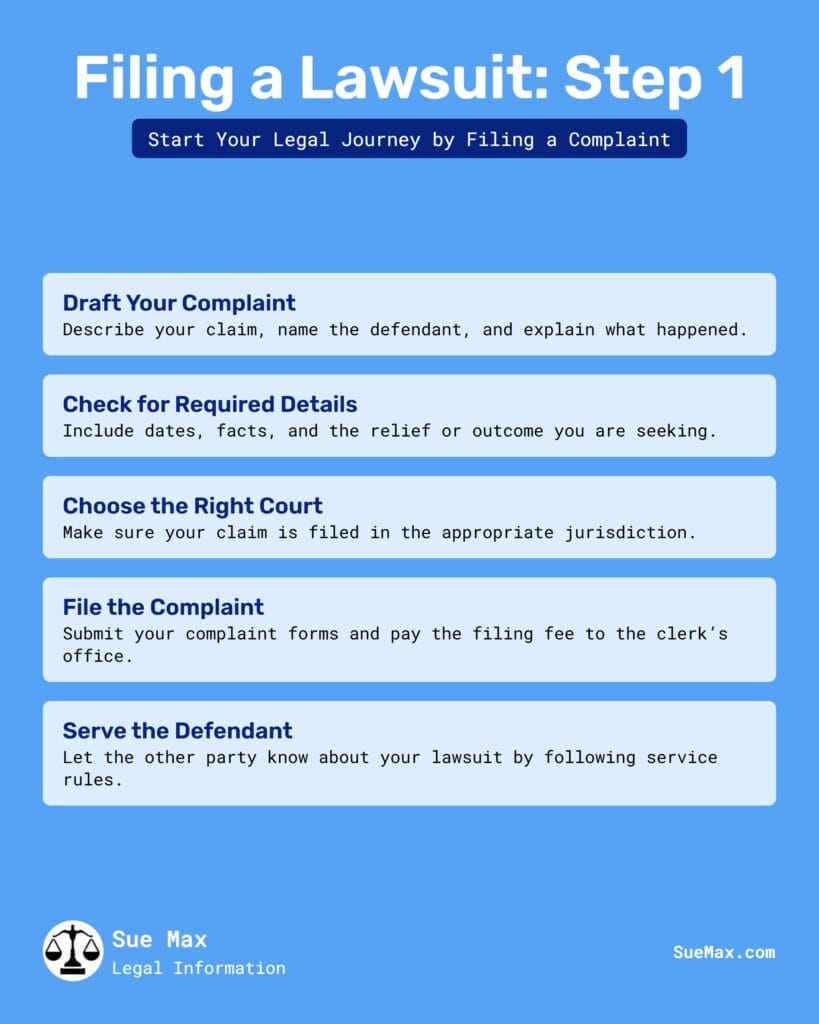
When you finally reach the clerk’s office (and hopefully haven’t lost your mind along the way), you’ll hand over your meticulously prepared documents. The clerk will review everything to ensure it’s complete and properly formatted. If they spot any mistakes—or heaven forbid, if something’s missing—you might have to go back and fix it all before they’ll accept your case. Talk about adding stress to an already stressful situation!
If you’re lucky enough to live in an area with online filing capabilities, congratulations! You get to skip the line and do everything from the comfort of your couch—bonus points if you’re wearing pajamas while doing so! Just follow their instructions carefully; uploading files is usually straightforward unless there are specific formatting requirements that make it feel like you’re trying to solve a complex math problem.
Once you’ve successfully filed your lawsuit—whether through old-school elbow grease or high-tech wizardry—you’ll receive confirmation from the court. This could come in various forms: an email notification or even a stamped copy of your documents that proves you’ve officially entered into battle mode against whatever injustice has been thrown your way.
So take a moment to celebrate this small victory! You’ve taken one giant leap towards standing up for yourself and seeking justice. But don’t get too comfortable just yet; there are plenty more steps ahead on this legal rollercoaster ride!
Serving Papers

👓 In 2014, a man in New York tried to serve divorce papers to his estranged wife by hiring a skywriter. Unfortunately, the plane got lost, and instead of “Divorce Papers” written across the sky, it ended up spelling out “I love you.” Talk about a dramatic twist in serving papers! 👓
“It’s not what you look at that matters, it’s what you see.” — Henry David Thoreau
After you file these documents (which honestly feels like sending out wedding invitations but a lot less pleasant), you have to serve them on the defendant. This includes making sure they know they’re being sued! You might hire a process server or deliver the papers yourself, depending on where you live and how brave you feel. That sounds like fun until you realize how hard it is.
Just think about saying, “Hello!” “I’m suing you!” while looking you in the eye requires guts! In that situation, who wouldn’t feel a little weird? It’s like going to a surprise party and finding out that you’re the one who is supposed to be astonished. Most people would rather hire professionals for this work since they know how to deal with these awkward circumstances with grace and dignity. We want to get this phase done quickly so we can go on to more fun things, like binge-watching our favorite series without having to worry about legal issues!
The Wacky World of Serving Papers
– The Unofficial Delivery Service: In some states, you can serve legal papers by simply handing them to someone at a party! Imagine crashing a birthday bash just to deliver a lawsuit. “Happy Birthday! By the way, you’re being sued!”
– Dogged Delivery: There’s a case where a process server tried to serve papers to a man but kept getting chased away by his dog. So, he dressed up as a mailman and finally got the job done—proving that sometimes you need to think outside the box (or doghouse)!
– The Sneaky Serve: Some people have been known to serve papers in very creative ways, like hiding them in pizza boxes or slipping them under car windshield wipers. It’s like playing hide-and-seek but with legal documents—definitely not your average game!
When it comes to serving papers, having a professional process server on your side can be a game changer. These are the unsung heroes of the legal world—the ninjas of paperwork delivery. They’ve mastered the art of showing up at someone’s door with a smile (and maybe a little dramatic flair) while handing over those all-important documents. Think of them as your personal delivery service, but instead of pizza, they’re delivering news that could change someone’s day—and possibly their life.
Process servers often have some wild stories from the field. You might hear tales about dodging angry dogs or encountering unexpected family reunions when they knock on doors. Imagine being greeted by an entire family gathering just as they hand over those papers; talk about timing! This is why it pays to let someone experienced handle this task—because nobody wants to deal with an irate defendant who feels blindsided.
If you’re feeling particularly bold and adventurous—or perhaps just really passionate about your case—you might consider serving the papers yourself. Just picture it: you walk up confidently to the person you’re suing and say something like, “Hey there! I’m suing you!” while trying not to fumble your words or break into an awkward laugh. Maintaining eye contact would be key here, but let me tell you—it could feel like trying to balance on a tightrope strung between two skyscrapers!
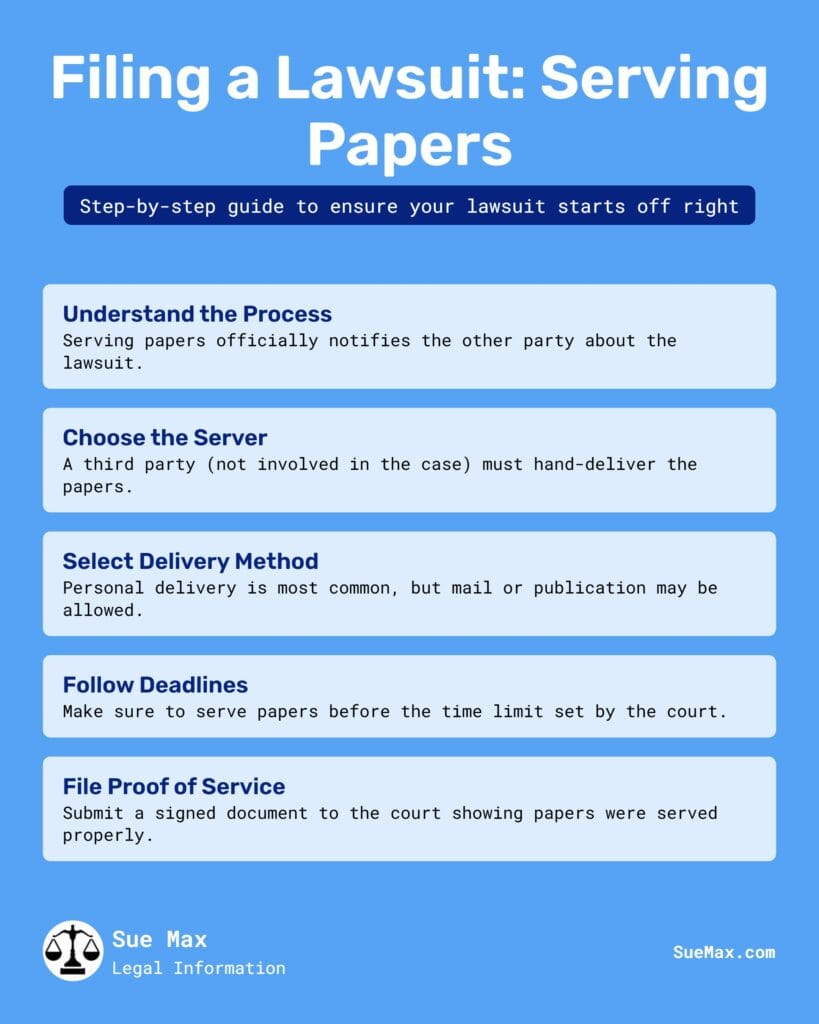
Before you use this self-service option, think about if it’s worth it. Not only does it take the same kind of bravery as a superhero facing off against their arch-nemesis, but it also makes things more complicated. What if things get out of hand? What if feelings are strong? If someone trained in conflict resolution takes care of this sensitive situation, it might save everyone from unnecessary drama.
The next stage is very important: making sure that the service is properly documented. This is true whether you hire a professional or do it yourself. Courts want to see proof that the defendant was really told about the litigation; if they don’t, it could cause delays or even dismissals later on.
So keep this in mind: serving papers may appear easy at first (how hard can it be to give someone some papers?), but there’s more to it than meets the eye! Be ready for whatever that comes your way on this crazy road toward justice, whether you choose to communicate your own message in a funny way or get aid from a professional.
Discovery Phase

👓 During the discovery phase of a lawsuit, one attorney famously requested all communications from the opposing party, only to receive an email that simply read, “I’m not saying you’re wrong, but have you considered that I might be right?” Talk about a revelation! 👓
“Discovery consists of seeing what everybody has seen and thinking what nobody has thought.” — Albert Szent-Györgyi
Now that everyone knows what’s going on (queue dramatic music), we go on to the discovery phase. This is like going through treasure boxes full of hidden gems…or skeletons, depending on how things go! During discovery, both sides share information that is important to the case. Expect some surprises. A buried document here or an unexpected witness there can change everything faster than my dog taking food off my plate while I’m not looking.
It’s really important to stay orderly during this time because, let’s be honest, chaos just leads to confusion, and no one wants that type of headache when millions are at risk! Imagine attempting to find a needle in a haystack while the clock is ticking. That’s how it feels when you’re looking for important papers or notes in a pile of papers. You might as well be looking for treasure on a deserted island!
Discovering the Discovery Phase
– The Great Document Hunt: During the discovery phase, lawyers often request tons of documents. It’s like a scavenger hunt, but instead of looking for candy or toys, they’re searching for emails and contracts. Who knew filing a lawsuit could feel like a game show?
– Interrogatories Are Not About Interrogating Aliens: Lawyers use something called interrogatories to ask questions in writing. It sounds super serious, but it’s really just fancy lawyer-talk for “Tell me what you know!” No aliens involved—unless your case is about UFOs.
– The Costly Copy Machine: Some lawsuits can lead to mountains of paper. In fact, one case had over 1 million pages of documents! That’s enough paper to build a fort—and if you get bored during the trial, you might just want to do that!
First, make a folder particularly for your case, either in real life or online. This will be your treasure chest, where all of your notes, documents, and evidence can reside together in peace. Make sure to label everything clearly. It’s like cleaning out your closet, but you won’t have to worry about finding an old shoe you forgot about! If you’re going digital (which I highly encourage), think about employing cloud storage services so you can go to your files from anywhere. You never know when inspiration could hit!
Next, make a record of all the documents that were sent back and forth. This includes anything from court papers to letters to your lawyer to any proof given by the other side. It’s important to have a detailed record of what was provided and when it was received. If there are any disagreements later about whether something was turned in on time or whether important information was missed, trust me, this will help.
It’s really important to write down what witnesses or experts say to you! These talks often give you important information that could help or hurt your case. So, after each conversation, take a few minutes to write down the most important things while they’re still fresh in your mind. Include things like dates, times, and specific quotes that stand attention. These small pieces of information could be very important to your case.

Making timelines can actually assist you understand what’s going on. Timelines and other visual aids help you see how events unfolded over time and draw attention to important events that could affect the outcome of your case. Also, they are incredibly beneficial during discovery when you need to make information plain and to the point.
Also, think about employing project management tools or apps that are made just for legal matters. You may use these tools to keep track of deadlines and get things done quickly. They are like personal assistants, but without the coffee runs! They’ll let you know when something needs your attention so that nothing gets missed.
Keeping things in order isn’t just about keeping things from getting out of hand; it’s also about giving yourself power during the whole process! By keeping detailed records and being proactive about handling your paperwork and correspondence, you may lower your stress levels a lot and enhance your confidence as you navigate this complicated legal terrain. After all, who wouldn’t want to walk into court feeling ready instead than hurriedly scanning through pages?
The Trial Process

👓 During a trial, jurors are often told to “leave their emotions at the door,” but one judge once had to remind them that they should also leave their snacks outside—after a juror was caught trying to smuggle in popcorn for an “emotional support snack” during deliberations! 👓
“Justice delayed is justice denied.” — William E. Gladstone
We’re going straight to trial if things haven’t calmed down by now or if you’re just truly dedicated. The trial starts with opening speeches from both sides, then they present evidence and summon witnesses, all while following stringent standards of courtroom etiquette (don’t forget that!).
In a courtroom, all sides get to make their case by carefully developing stories that are meant to convince judges or juries to agree with them. This procedure can be very emotional and tense, as both sides try to show the merits of their case while tearing down the other side’s assertions. The stakes are enormous, and every word said can have a big effect on the outcome.
Trials and Tribulations: The Trial Process
– Jury Duty: The Ultimate Reality Show: Being on a jury is like being part of a reality show, but instead of voting people off the island, you decide who wins the case. Plus, there are no confessional booths—just lots of waiting and snacks!
– The “Objection!” Workout: Lawyers love to shout “Objection!” in court. It’s like their version of cardio! Every time they do, it’s a mini workout for the heart—and sometimes just as dramatic as an action movie.
– The Judge’s Gavel: A Secret Weapon: That gavel the judge bangs isn’t just for show; it’s like their superhero signal. When they pound it, everyone knows it’s time to listen up. It’s also great for getting attention at family dinners—just don’t try it with your mom!
It’s important to remember, though, that courtroom drama isn’t necessarily exciting or glamorous. Sometimes it feels like you’re waiting for popcorn kernels to pop—slow at first and not much happening. Witnesses may take a long time to testify, legal jargon can make things less clear, and procedural motions might drag on forever. Everyone engaged knows that behind the scenes of everyday conversations is a fight for justice, which makes the anticipation grow.
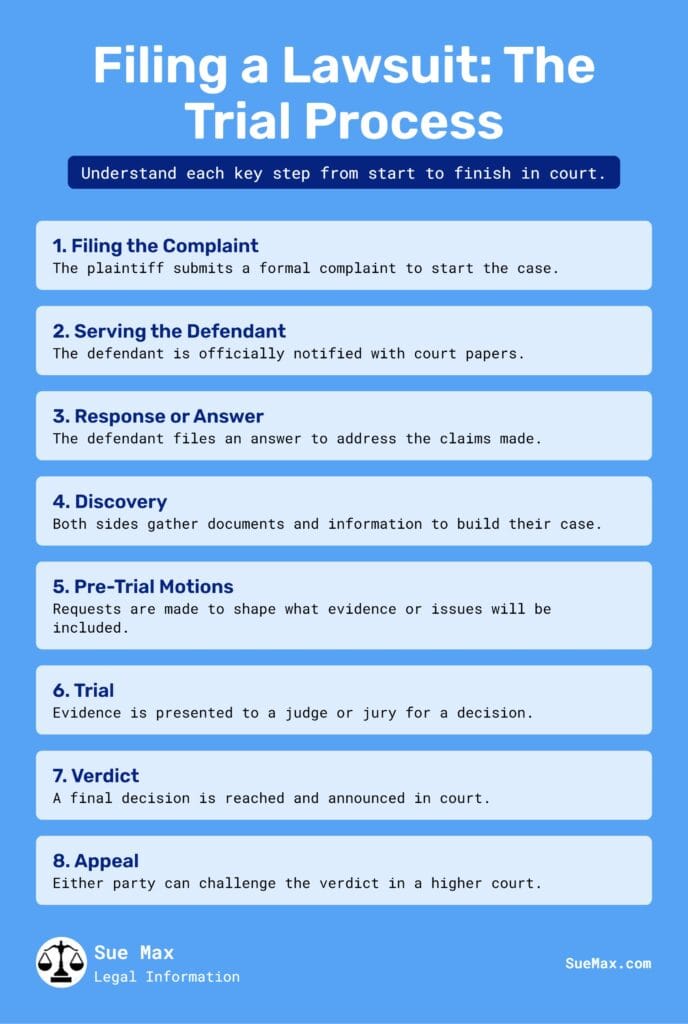
But when the verdicts are finally read, all the stress and worry turn into an exciting moment. As the jurors think about the case, the air gets thicker with tension. Each second feels like an eternity. And then the announcement comes, the end of weeks or even months of hard work and emotional investment. That moment sums up everything, whether it’s a great win or a terrible loss. All the nerve-wracking moments finally make sense as justice is given… hopefully!
Even if it can be boring, the courtroom is nevertheless a place where human tales play out, full of conflict, resolution, and occasionally salvation. This reminds us that underneath all the rules and procedures is the very essence of our quest for truth and fairness in society.
Conclusion: Celebrating Your Victory
It doesn’t matter if it ends with cheers or tears; going through this trip teaches important lessons about being strong and standing up for yourself. Filing a lawsuit may seem scary at first, but now that you know what to expect, you can face any problems that come up along the way with confidence.
Get ready for this is the first day of your quest for justice. The adventure is about to begin!
Suggested Resources
Legal Information Institute
https://www.law.cornell.edu/wex/lawsuit
Nolo’s Guide on Suing Someone
https://www.nolo.com/legal-encyclopedia/suing-someone.html
FindLaw – Steps Involved in Filing a Lawsuit
https://www.findlaw.com/litigation/filing-a-lawsuit.html
American Bar Association – How to File a Lawsuit
https://www.abajournal.com/magazine/article/how_to_file_a_lawsuit
Frequently Asked Questions
How do I know if I have a valid lawsuit?
You must determine whether your claim has legal merit, usually by consulting an experienced lawyer. They can assess whether negligence, breach of contract, or injury justifies filing.
What evidence should I collect before filing a lawsuit?
Gather contracts, emails, photos, messages, receipts, and witness statements. Well-organized evidence strengthens your claim and supports your legal arguments.
How do I choose the right lawyer for my case?
Select an attorney who specializes in your case type and communicates clearly. A strong track record and transparency during consultations indicate a reliable fit.
What information is required when filing a complaint?
You must list both parties, outline what happened, and explain the relief you seek. Accuracy and detail ensure the complaint is accepted without delays.
How are legal papers served to the defendant?
Papers are served through a process server, sheriff, or qualified adult, depending on local rules. Proper service ensures the defendant is notified and the case can proceed.
What happens during the discovery phase of a lawsuit?
Both sides exchange documents, evidence, and written questions. Staying organized throughout this phase helps you respond accurately and prepare for trial.
What should I expect if my case goes to trial?
The trial includes opening statements, witness testimony, evidence presentations, and closing arguments. The judge or jury then decides the outcome based on the facts.

Kevin Collier is a legal expert passionate about simplifying complex legal concepts for everyday individuals. With a focus on providing clear, practical information, he covers a wide range of topics, including rights, responsibilities, and legal procedures. Kevin aims to empower readers with the knowledge they need to navigate the legal landscape confidently, ensuring they can make informed decisions regarding their legal matters. Through insightful articles and easy-to-understand resources, he helps demystify the law, making it accessible to all.







